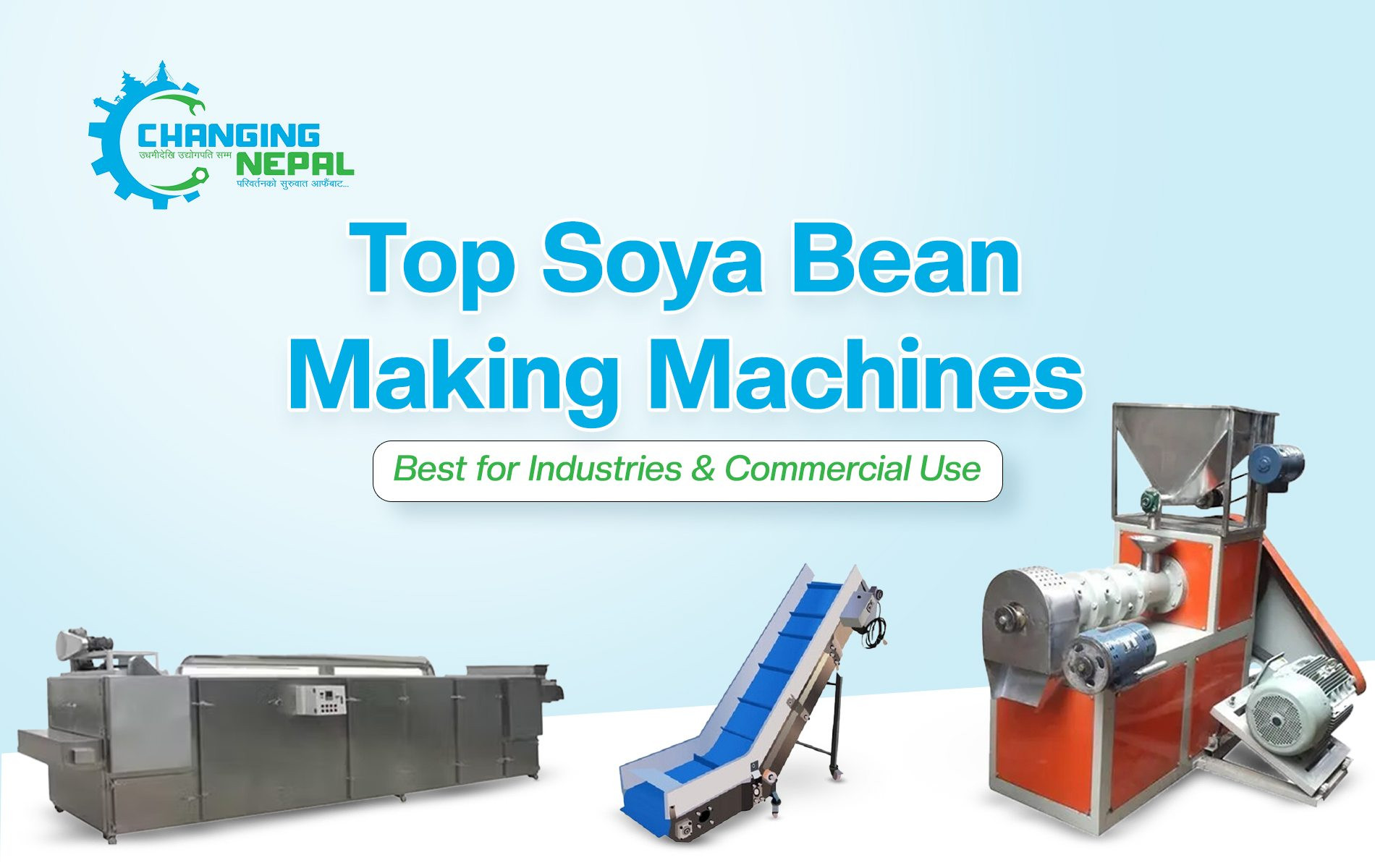
Call Us Now
+977-015907985
Soya bean products, particularly soya milk, tofu, and soya paneer, are quickly rising in popularity in Nepal, as nutritious food options and as a popular business opportunity. As Nepal's food processing sector develops, dependable, efficient, and high-capacity soya bean processing machines have become increasingly important for industrial and commercial producers to supply a growing market. In this blog, the best soya bean processing machines available for use in the industry and commercial in Nepal, a summary of their features, capacity, and general suitability for use in the Nepali market is provided.
Soya beans are an excellent source of proteins and other nutrients, which makes them an excellent raw material for all kinds of food products. The demand for plant protein and dairy alternatives has created high returns for producers to add soya-based products to their line-up.
The utilization of industrial-grade soya bean machines provides the following advantages:
2. Soya Paneer Production Machine (220-330 L/hr):
When looking for a soyabean making machine to use at small businesses or local vendors, the most important considerations are price, size, and usability. Because small businesses generally only make very limited amounts (approximately 50 to 100 liters/hour), they are typically trying to test the market or run a small niche. In this case, semi-autonomous and compact machines fit the bill best because they can fit in relatively small spaces, have a lower up-front price, and can produce the same uniform quality needed to sell for local resale or distribution. In addition, for a small business vendor, the ability to operate a machine and fix issues with little or no training can be essential.
Medium-sized businesses in general, like cafes making soy-based beverages and snacks, generally require machines capable of 150 to 300 liters per hour. This individual product density and no-room-for-error guarantees with a more automatic machine will create a machine product with a higher overall kg/hour ratio and less operator-related friction involved when utilizing the machine. This allows for higher precision and control of the parameters you would wish to control in any situation (i.e., grind time, pasteurization temperature, and meeting time) as well as initiating a "two-fer" machine (i.e., soy milk, tofu, paneer). This swapping between the output capacity of the machine and the operational capacity of the machine in a quality mode for food usage presents some operating prudence problems, where it needs to be balanced to a commercial level of hygiene.
Large-scale industrial food processors and manufacturers in Nepal require strong soyabean processing equipment, which will run continuously and produce over 300 liters or kilograms per hour. These kinds of machinery, completely automatic, are built with heavy-duty grinders, heaters, and separator machinery, and are backed by comprehensive after-sales service, warranty, and technical support. Industrial machinery optimizes production, optimizes the utilization efficiency of resources, and optimizes product consistency to provide bulk orders to retail chains, institutions, and export markets. If a firm chooses the right industry machine with the appropriate investment, good efficiency will be generated for a large business.
The development of the soya bean processing sector in Nepal has multiple advantages:
Nepal's processing industry is growing fast, and soya bean product production is one of the promising opportunities for sustainable development. With new investments in advanced soya bean production machinery from Changing Nepal Pvt. Ltd., businesses and manufacturing industries will be able to produce high-quality, healthy products with visions of modern consumers in domestic as well as global markets.
Transform the agricultural field and food industry sector of Nepal, and be the answer by using the best soya bean production equipment. With Changing Nepal Pvt. Ltd., businesses can innovate, grow, and be part of Nepal's economic future by promoting a healthy population and a strong industrial base.
If you want to upgrade yourselves in the production chain and become a soya industry leader in Nepal, then contact Changing Nepal Pvt. Ltd. and begin your journey towards a bright future today.
A 50 to 100-liter per hour capacity semi-automatic or compact soya bean making machine would be a good bet for small enterprises and startup dealers. These are cost-effective, simple to use, and require little space, hence perfect options for piloting the market or niche demand and confirming consistent product quality.
Finally, it depends on the size of your production and on your budget. Automatic machines will generally have more capability (150 liters/hour and more), which will minimize the labor in your processes, and will have more control over processing parameters. Semi-automatic machines, even though able to perform, will be no more than satisfactory for small operations and are less costly. Consider your expansion plans, output capacity, and technical know-how to decide.
Yes, long-lasting and hygienic soya bean making machines with food-grade stainless steel (usually SS-304) construction are readily available from good suppliers in Nepal. Food-grade construction means that it is food safe, will not rust when processing foods, and will not transfer contaminants into the food.